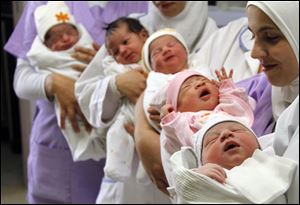
Congratulations! Now let’s check if your newborn will be obese
Parents’ body mass ratios, birth weight play roles
12/10/2012
A checklist, published recently in the journal PLoS One, uses just six inputs to determine a newborn’s probability of remaining obese (in the absence of early intervention) throughout childhood and beyond: his or her parents’ body-mass indices (BMI), the baby’s birth weight, the mother’s weight gain during pregnancy, the number of members in the baby’s household, the professional category of the baby’s mother, and whether mom smoked during pregnancy.
All right, you’ve heard your newborn bundle of joy’s lusty cry; you’ve counted his or her fingers and toes; you might just have learned the baby’s gender. So let’s not waste another minute before sucking the joy from this picture of blissful innocence and answering a key question about his or her health and appearance: Will he or won’t she be fat?
Noting that “prevention of obesity should start as early as possible after birth,” international researchers have devised a checklist of factors that can be quickly toted up at a mother’s bedside to predict with moderate certainty — an accuracy of between 71 percent and 85 percent — her newborn’s prospects of becoming obese.
The resulting checklist, published recently in the journal PLoS One, uses just six inputs to determine a newborn’s probability of remaining obese (in the absence of early intervention) throughout childhood and beyond: his or her parents’ body-mass indices (BMI), the baby’s birth weight, the mother’s weight gain during pregnancy, the number of members in the baby’s household, the professional category of the baby’s mother, and whether mom smoked during pregnancy.
A child’s prospects of obesity were “largely driven” by his or her parents’ BMI, researchers found: If one or both were obese, the baby’s odds of joining them in that status increased steadily as a function of how obese, and whether one or both were obese. But other factors—mom’s avoidance of tobacco while pregnant, a larger number of household members, a mother’s status as a professional rather than an unskilled worker—could powerfully check the bad start that came from having an obese parent (or two).
Least likely to become obese was a baby born into a household of five people who weighed about 6.5 pounds (3 kg) at birth and had a normal-weight father and a professional mother of normal weight who didn’t smoke during pregnancy. This baby’s likelihood of becoming obese in childhood was calculated at 0.13 percent.
By contrast, a baby born at close to 9 pounds into a household of three, including an obese father and a mother with a BMI of over 35 who smoked during pregnancy and worked as a skilled manual laborer had a probability of childhood obesity of more than 77 percent.
Importantly, the researchers set out to include genetic variations that would help predict a baby’s prospects of accumulating too much fat. In the end, they found that none of the known genetic variations associated with obesity predicted a baby’s future girth as powerfully as the six factors listed above.
Like many tests that predict a poor health outcome, however, this one comes a little ahead of efforts to identify what, exactly, will change a child’s upward weight trajectory. Research suggests that breastfeeding helps, and that babies who are not fed solid food before six months are less likely to become obese than those who are. Television viewing and drinking sugar-sweetened beverages such as juice and (yes, it happens) soda are associated with higher rates of child obesity. And food security appears to be important too: Parents unsure of their ability to provide their babies a steady source of nutrition tend to feed them in ways that promote obesity, one study has shown.
The study does underscore the powerful role an expectant mother can play in her baby’s future health prospects: Even if she’s overweight before pregnancy, limiting pregnancy weight-gain and not smoking can reduce her baby’s chances of becoming obese.
The authors of the study, however, point out that no single set of “interventions” has yet been identified and tested to alter a child’s probability of becoming obese. And they’re careful to caution against putting babies on a diet: Not only are parents notoriously poor at it, they write, restricting calories early in life could have “potential, unknown harmful effects” on the child.
Until researchers can identify and test a safe and effective slate of interventions that bend the projected weight curve downward, the authors write, this quick-and-easy checklist may not be quite ready for prime time. They worry about stigmatization of families whose infants are labeled “at risk,” and about the false reassurance that other families may feel if their infants are judged unlikely to become fat.